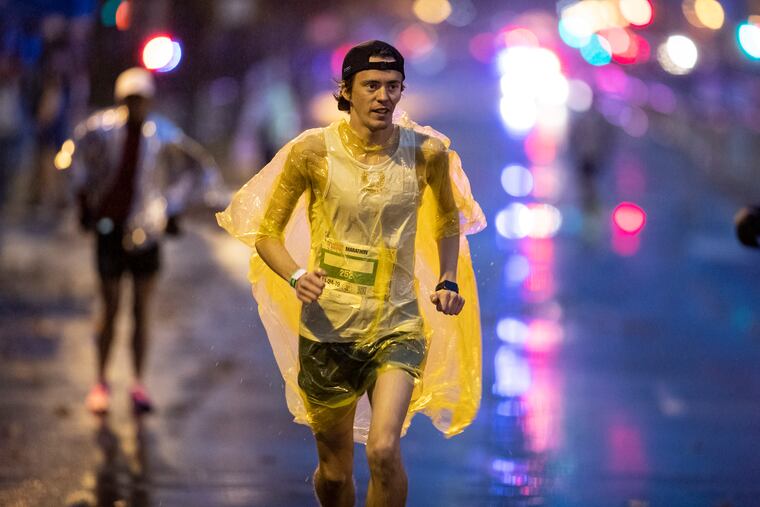Philly Marathon weather should be near perfect for runners, if not for spectators
Based on two comprehensive studies, Sunday's weather couldn't be better for runners

Sunday morning is expected to dawn chilly and dreary. In other words, what it might be like if a whole lot of runners were running the atmosphere.
Based on two comprehensive studies by researchers who did some serious legwork, weather conditions for Sunday’s Philadelphia Marathon should be near ideal, with temperatures ranging from 40 to 45 degrees during the race, riding a negligible breeze.
The forecast for Saturday morning’s half marathon has a distinctly more December feel, and in fact it might be the coldest morning of the season with temperatures below 30 before race time. But they will recover quickly and be in the mid-30s by the time people reach the finish line.
» READ MORE: Runners must be vaccinated for Philly Marathon, organizers say
“That’s perfect as far as I’m concerned,” said Seth Weiss, head of the Philly Runners club and who plans to be among the 10,000 participating in Saturday’s race. “On the cold side of perfect, but I prefer cold over hot.”
And get this: The National Weather Services lists the precipitation probability Saturday at 0%, with puny winds of 2 to 3 mph.
The only remotely possible blemish Sunday, when another 10,000 will be running, would be a “sprinkle” borne on weak — as in 1 to 3 mph — easterly winds, said Paul Walker, a senior meteorologist with AccuWeather Inc. But the weather service lists the chances of any precipitation of 0.1 inches or more through 9 a.m. at 0%.
And for marathoners, the sun should be no sweat, with skies forecast to be around 80% cloud-covered.
About those studies
A team of French sports-medicine experts looked at the times of 1.8 million participants in marathons in Boston, Chicago, New York, Paris, London, and Berlin from 2001 to 2010 and concluded that temperature was the dominant weather variable in performance.
Its analysis, published in 2012 in the journal PLOS One, found that among all classes of runners — elite, and not so elite, male and female — the ideal temperature was about 44 Fahrenheit, with drop-offs at higher and lower readings.
» READ MORE: Sports psychologist’s 4 tips to mentally prepare for Philly Marathon | Expert Opinion
In July of this year, another team, which included researchers from Greece, Denmark, Australia, and Qatar, examined 1,258 races from marathons to steeplechases and also found that temperature was the prime variable in promoting the fastest times.
However, they also looked at something called the Wet Bulb Globe Temperature, an all-encompassing index computed by a complex formula that takes into account the air temperature, atmospheric moisture, cloud cover, and winds into one number.
They came up with an ideal figure that is close to what it will be at 8 a.m. Sunday.
Those forecasts remain “experimental,” the weather service says, and thus are not yet issued publicly.
They are shared with emergency managers and some planners of outdoor events, however, since the forecasts more completely capture the risks, said Jonathan O’Brien, a meteorologist with the National Weather Service Office in Mount Holly.
The index is particularly useful during extreme heat events, and the weather service says OSHA and “many nations” use it to regulate workload limitations.
Good timing
Weather is a wild card, but it has never canceled the race, and as long as the Philadelphia Marathon is held on the third weekend of November, extreme heat is unlikely to be an issue — that’s unless the climate system goes kablooey.
Normal lows this time of year are close to that performance sweet spot, around 40.
But that wasn’t what the organizers had in mind when this all started 27 years ago, said race director Kathleen Titus.
» READ MORE: Racers return for Broad Street Run after a pandemic pause
One consideration was the fact that it was the weekend before the holiday season kickoff, she said. The likelihood of generally favorable running weather has turned out to be a collateral benefit.
Other spring and fall marathons, one would think, would be similarly inoculated against heat. The Boston Marathon, for instance, is held the third week in April, when it’s been known to snow up there. However, Boston marathoners suffered through brutal heat in 1975 and 2012.
Said Weiss, “I definitely don’t know anybody who would prefer 80-plus degrees and high humidity.”
There will be a preliminary cap of 10,000 in-person runners for the full 26.2-mile marathon, a 10,000 cap on the half marathon, and around 3,500 for the 8K race, for a total of about 24,000 in-person participants.